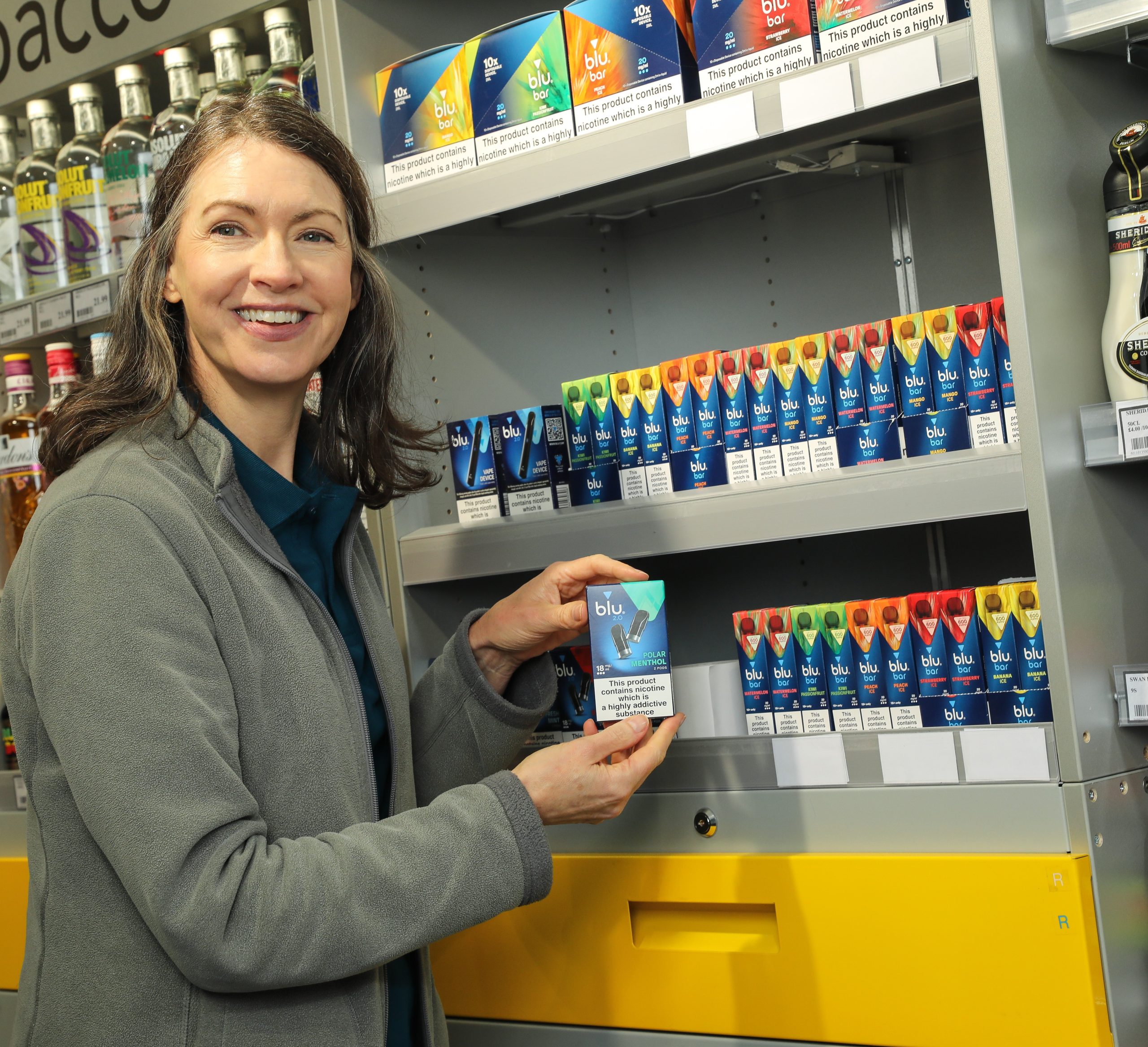Navigating the future
April 22, 2024

The vape industry is already planning creatively on how to deal with the upcoming disposable vapes ban, which lands on the market in April 2025
In the wake of evolving regulatory landscapes and heightened concerns regarding environmental sustainability, the imminent ban on the sale and supply of disposable vapes presents a pivotal moment for the vaping industry.
With a countdown of 12 months until implementation, leading brands are gearing up to navigate this transformative shift. From innovative product development to sustainable initiatives, these brands are committed to not only complying with regulations but also shaping the future of vaping in a responsible and forward-thinking manner.
Business as usual
While the disposable vapes ban announcement may have brought concern for many retailers, Yawer Rasool, consumer marketing director UK & Ireland at Imperial Brands, notes that the ban is not set to come into force until 1 April 2025.
“For now, it’s business as usual,” he says. “Whatever the outcome, we will endeavour to fully support our trade customers in understanding exactly what any regulatory changes will mean for them and their business. This will include guidance on any specific actions that need to be taken and when to ensure they’re fully prepared for the implementation of new regulations.”
He adds that despite the announcement, it’s unlikely that the demand for disposable vapes will slow down any time soon.
“So we recommend that retailers continue to stock a wide range of leading disposables, like our new blu bar 1000, in order to cater to this trend and in turn, maximise sales,” he suggests.

Chris Allen, chief executive at Broughton, an independent contract research organisation, agrees, and asks the brands and retailers to reassure customers that these products are not illegal.
“Although a ban is coming into force, this is not expected to take effect until April 2025. In the meantime, outlets can continue to sell these products,” he says.
“Once the ban comes into force, the industry must make the public aware of the risks of buying disposable vapes. Although there may be old stock left on the market, many of the products being sold will be illicit and unlikely to be compliant with the UK TRPR Regulations.”
Viable alternatives
Eve Peters, director of government affairs for Elfbar in the UK, says viable alternatives to single-use vapes have been their focus as a brand for some time now.
“It’s imperative those using single-use vapes as a cessation tool understand there are convenient and cost-effective alternatives to disposables post-ban. Raising awareness among retailers and consumers that prefilled pod kits feature the same consistency of delivery, flavour options and overall experience is a priority,” she says.
She highlights that their Elfa Pro prefilled pod kit captures the experience of its single-use counterpart, including flavours – a key factor in adults transitioning from smoking.

In addition, their sister brand Lost Mary recently launched Tappo, its first prefilled pod system, with a rechargeable battery and replaceable pods, which is also compatible with Elfa Pro pods.
“The new closed-pod system lets adults replace the e-liquid with prefilled pods once finished, cutting down on waste. Both Elfa Pro and Tappo are easy to use and affordable options to help transition from single-use vapes,” Peters says, adding that there are more products in the pipeline which will be available later in the year.
“We will be launching a number of new, technologically-driven devices. These include prefilled pod-based systems, and innovative devices that are expected to see a substantial increase in commercial popularity, providing retailers with the opportunity to build a significant offering for their customers catering to varying tastes and needs,” Peters added.
In addition, Elfbar will soon bring the latest generation QUAQ, a combination of the industry’s leading atomising technologies, to elevate user experience to a new level.
Peter notes that this reflects only part of their effort to update their product category amid the changing regulatory environment.
“The success of our single-use vapes comes from their convenience, user-friendly design, exceptional flavour offerings, and consistency in flavour delivery, complemented by our innovative technology,” she commented.
“The single-use ban will have an impact on the industry and our business. However, our alternative devices embody the qualities that contributed to the popularity of our single-use offerings but are available in a rechargeable and reusable format.”
Eve thinks the focus on refillable and rechargeable devices will help minimise the impact of the single-use ban while fostering long-term brand growth and sustainability.
“Adult vapers are shifting towards more sustainable alternatives, with an emphasis on refillable and rechargeable devices to further reduce waste and environmental impact,” she said. “By staying attuned to these trends, we’re delivering innovative products that meet the evolving needs and preferences of smokers and ex-smokers on their journey to quitting cigarettes.”

Rasool says Imperial Brands remain committed to rapid innovation within their blu brand portfolio to offer adult nicotine users a range of quality, satisfying and responsibly marketed alternatives.
“At the moment, it’s unclear how the proposed ban will have an impact on consumer buying behaviour. However, it may be that we see adult vapers switching to other vaping products, like pod-mods or open systems, for example,” he opined.
Broughton’s Allen also expects a rise in demand for pods post-ban.
“I’m certain that we’ll see a range of approaches but, most likely, we’ll see a growth in pod-based products, with manufacturers looking to get as close to the ease of use and sensory experience of disposables as possible,” he says.
“We also expect companies to look at other nicotine products, such as pouches and films.”
With both closed pod systems and open systems account for 17 per cent of the UK vaping market [ITUK EVP Report on Trade, Jan 2023], Rasool advises retailers to stock a range of leading pod systems, such as their blu 2.0 device, and offer information on pod systems and advice tailored to each customer that will help them to make an informed purchasing decision.

“There are various ways to train staff but one particularly effective way of improving staff knowledge on pod systems is through running product demonstrations using samples of the devices being sold in store,” he suggests.
“Allowing staff to handle the products themselves so they get to know the different components, using demonstration models or sample liquids, will really help them understand more about how they work, meaning they can pass this information onto customers. Using similar demonstration models can also be a great way to educate customers on the devices before they buy so they leave the store fully informed on how to use a product.”
Elfbar’s Eve Peters also dwells on the role of retailers in helping smokers and ex-smokers transition from single-use vapes to rechargeable alternatives.
“Key to this is introducing rechargeable vape starter kits, understanding preferences and addressing any questions or concerns for consumers,” she says.
“These can highlight differentiating features, including ease of use, cost benefits and the reduction of waste when compared to their single-use counterparts. Additionally, sharing informational materials on the benefits of rechargeable vapes and exploring collaborations with vape brands for joint campaigns will support a positive transition.”
Tackling the fakes
The disposable vape ban is likely to encourage an influx of illicit products, as highlighted by warnings from retail bodies and industry groups. With many illicit products wrongfully regarded as safe and regulated devices, retailers need support to ensure they are buying legitimate products and are aware of new and impending regulations.
“Many brands have authenticity checks in place (e.g. barcodes), so brands should continue to adhere to their existing process. Any authentic products must still adhere to the TRPR regulations, so purchasing from reputable outlets or directly from the manufacturer should ensure that the products have been through the required compliance checks,” Allen says.

Peters asks retailers to protect customers by warning them about the associated dangers of illegal, non-compliant products, and report information related to illegal products either to Crimestoppers on 0800 555 111 or their local Trading Standards team.
“To address further issues faced by the vaping industry in the pursuit of a safe and compliant landscape, we have implemented a strategy to seek to address the proliferation of illicit vapes,” she explains.
“These proactive measures include collaborating with law enforcement to shut down 200 companies in multiple global markets engaged in counterfeiting vaping products from 2022, and this number is growing. We are now forging cross-border collaborations with regulators in some Southeast Asian markets where the manufacturing of counterfeits has become increasingly commonplace since the anti-counterfeiting drive in China phased them out.”
Elfbar also participates in efforts focussed on raising awareness of illegal vapes with strategic partnerships, including collaboration with FACT, a leader in intellectual property protection. Through FACT’s corporate partnership with Crimestoppers, the brand has supported campaigns via the Association of Convenience Stores and the Scottish Grocers’ Federation to encourage retailers to report illegal vapes.
Rasool recommends that retailers should check up on the No ID No Sale guidelines, which offer lots of advice for staff training and tips on the use of a Refusals Register. In addition, the free retail packs offered contain lots of point of sale merchandise like Statutory Tobacco Notices and Age-Related posters along with “Scan Me” and “No ID No Sale!” badges and shelf wobblers.
“For now, there are no changes required to retailers’ disposable range. We do, however, highly recommend that retailers familiarise both themselves and their staff with No ID No Sale guidelines and ensure that all products sold in store are compliant with current regulations. If any retailers are unsure, then they should speak to their local Trading Standards team or trade association,” he says.
